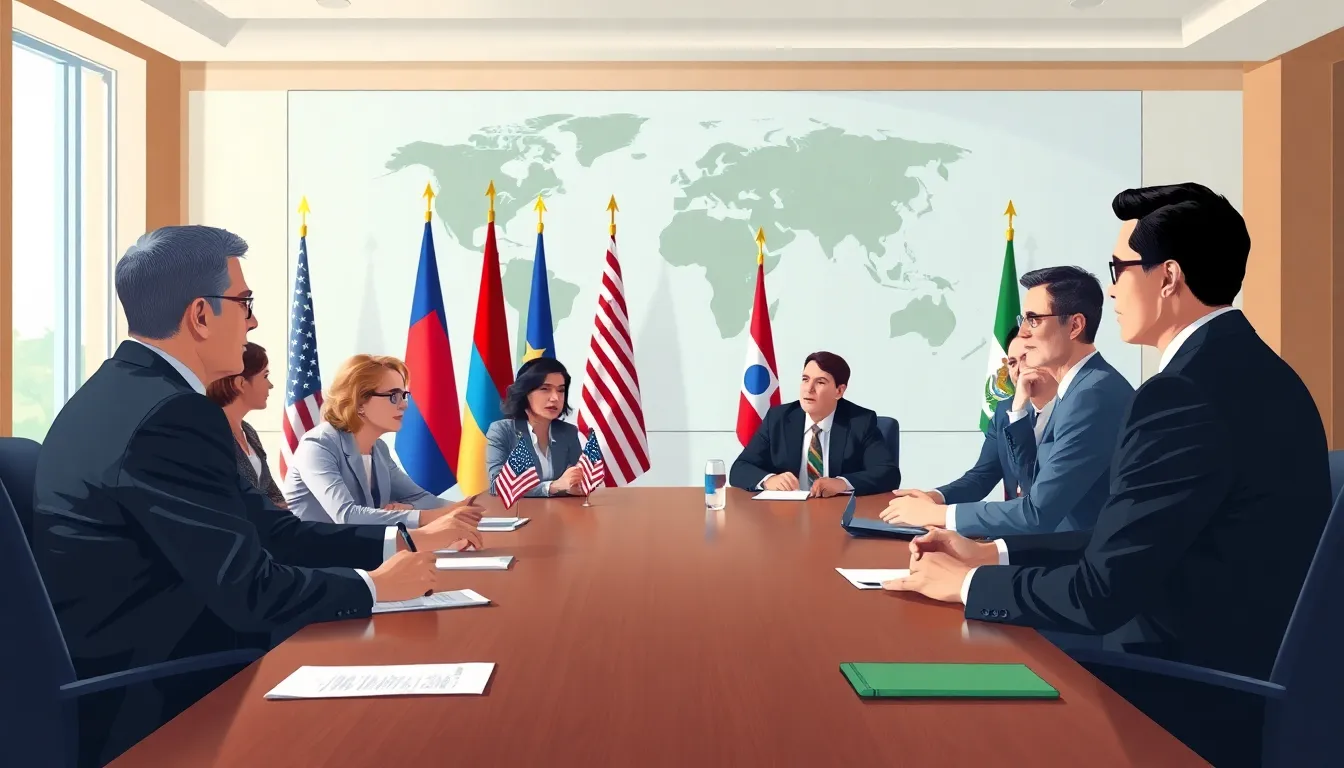Table of Contents
ToggleIn a world where borders blur faster than a toddler’s crayon drawings, global affairs have become the hot topic of every dinner table debate. From trade wars that feel like sibling squabbles to climate agreements that resemble awkward family reunions, understanding these dynamics is essential for anyone who wants to keep up with the times—or at least sound smart at parties.
Navigating the intricate web of international relations might seem daunting, but fear not! With a sprinkle of humor and a dash of insight, this article will unravel the complexities of global affairs. Whether it’s geopolitics, economic shifts, or the latest diplomatic drama, there’s always something happening that impacts us all. So grab your favorite beverage and get ready to dive into a world where every headline could spark a lively discussion—or at the very least, a few raised eyebrows.
Understanding Global Affairs
Global affairs encompass the relationships and interactions between nations, involving economic, political, and social dimensions. They influence the way countries cooperate on issues like trade, security, and environmental challenges.
Definition and Scope
Global affairs involve various elements that shape international interactions. Political relations between nations dictate agreements and negotiations. Economic policies influence trade agreements and economic sanctions. Environmental issues, such as climate change, require multinational cooperation for effective solutions. Together, these components form a landscape where global actors strive to address complex challenges. Different organizations, like the United Nations and the World Trade Organization, also play vital roles in facilitating discussions and promoting collective action.
Importance in Today’s World
Understanding global affairs remains crucial in today’s interconnected society. International trade affects local economies and employment. Recognition of global conflicts aids in regional stability and peacekeeping efforts. Awareness of diplomatic relations influences foreign policy decisions that affect national security. Addressing global crises, such as pandemics or climate change, requires collaborative efforts among countries. Engaging with global affairs sets the foundation for informed citizenship and responsible engagement in world issues.
Key Players in Global Affairs

Multiple entities shape global affairs, primarily including governments, states, and international organizations. Their interactions significantly influence international relations.
Governments and States
Countries act as principal actors in global affairs. Each government formulates policies that reflect its national interests. Decisions made by leaders impact trade relationships and security agreements. For instance, the United States and China engage in ongoing discussions regarding tariffs and technology sharing. Regional alliances, such as the European Union, enhance cooperation among member states, promoting economic and political stability. Additionally, developing nations seek a voice in global negotiations, advocating for climate justice and fair trade practices.
International Organizations
International organizations play crucial roles in facilitating dialogue and collaboration. The United Nations addresses security and humanitarian issues, offering platforms for conflict resolution. Its various agencies, such as the World Health Organization, handle global health crises. Similarly, the World Trade Organization focuses on establishing trade regulations that benefit member countries. The International Monetary Fund aids countries in financial distress, ensuring economic stability. These organizations create frameworks for collective action, fostering cooperation among states to tackle pressing global challenges.
Major Issues in Global Affairs
Global affairs encompass pressing issues like climate change and international trade. Understanding these critical areas shapes responses to worldwide challenges and affects daily life.
Climate Change
Climate change represents one of the most significant threats facing humanity. Rising temperatures lead to severe weather patterns and natural disasters, impacting economies and communities. Collaborative efforts among nations prove essential for addressing this issue effectively. Agreements such as the Paris Accord reflect a collective commitment to reduce carbon emissions. Developing countries often face the greatest challenges, requiring support from wealthier nations for adaptation and mitigation initiatives. Efforts in renewable energy sources draw attention as viable solutions to lessen dependence on fossil fuels. Global awareness raises urgency around climate action, promoting sustainable practices and policies that contribute to a healthier planet.
International Trade
International trade plays a pivotal role in shaping global economies. Fluctuating tariffs and trade agreements directly influence local markets and consumer choices. Countries engage in negotiations to balance trade benefits while protecting domestic industries. The trade relationship between the United States and China exemplifies the complexities involved. Changes in policies can lead to widespread economic implications, impacting jobs and prices. Organizations like the World Trade Organization facilitate discussions around fair practices, aiming to maintain a level playing field. Increasingly, countries emphasize sourcing from ethical suppliers, responding to consumer demand for transparency and responsibility. Understanding these dynamics equips citizens to engage with significant international decisions that affect everyday life.
The Role of Technology in Global Affairs
Technology plays a pivotal role in shaping contemporary global affairs, influencing communication, security, and economic interactions among nations.
Communication and Information Sharing
Enhanced communication technologies facilitate real-time information sharing across borders. Instant messaging, video conferencing, and social media platforms connect people and governments, promoting dialogue. Robust digital platforms empower organizations to disseminate critical data during crises, keeping populations informed. Additionally, collaborative tools help diplomats negotiate agreements efficiently, fostering transparency. These advancements allow for broader citizen engagement in global issues by making information readily accessible.
Cybersecurity Challenges
Cybersecurity represents a significant challenge in global affairs. Increased reliance on digital systems exposes nations to cyber threats that can disrupt critical infrastructures. Scenarios range from data breaches to attacks on financial systems, highlighting vulnerabilities in national security. Collaborative international efforts are essential to combat these risks, as shared intelligence can bolster defenses. Policymaking must also adapt to the evolving landscape of cyber threats, ensuring comprehensive strategies protect both citizens and economies.
Staying informed about global affairs is more crucial than ever. As nations navigate complex relationships and face shared challenges like climate change and trade dynamics, understanding these issues empowers individuals to engage meaningfully in discussions.
The interplay between governments, international organizations, and the global economy shapes the world in which everyone lives. By fostering awareness of these topics, individuals can contribute to a more informed and responsible global community.
In an age where technology influences every aspect of life, the importance of cooperation and dialogue among nations cannot be overstated. Embracing the complexities of global affairs not only enriches personal understanding but also enhances the ability to advocate for positive change.




